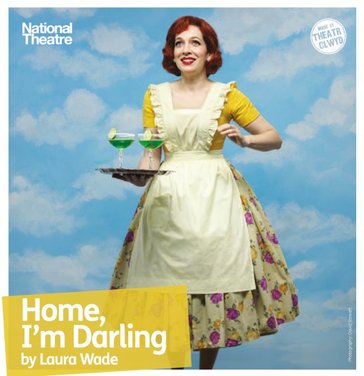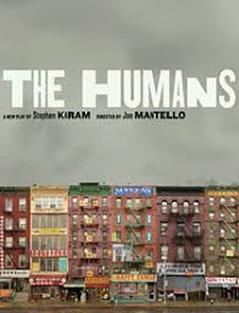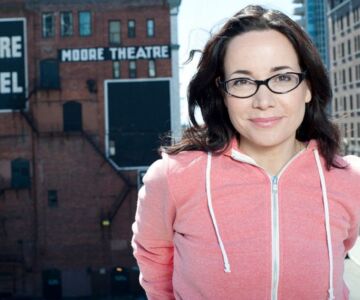 “Home, I’m Darling”: Hey Mama Welcome to the ‘50s, oh oh oh oh oh ohby Randi / September 6, 2018
“Home, I’m Darling”: Hey Mama Welcome to the ‘50s, oh oh oh oh oh ohby Randi / September 6, 2018As summer plays close and the new season slowly gets into gear, London’s drama scene got a much needed infusion of American greatness with the Broadway transfer of “The Humans”. Stephen Karam’s 2015 work about an ordinary American family and the hardships they face individually and together comes to London’s Hampstead Theatre with its Broadway cast intact, along with my favorite Broadway director-that-I-once-saw-give-one-of-the-best-acting-performances-ever-in-The-Normal-Heart-but-that’s-neither-here-nor-there, Joe Mantello, still at the helm. Winner of the 2016 Tony Award for Best Play, “The Humans” seems like the basic story of a typical family at first, but its brilliance lies in nuance and individual interpretation that will have you contemplating it endlessly.
The play tells the story of the Blake family, from Scranton, Pa., coming together to celebrate Thanksgiving amid a snowstorm at their daughter Brigid’s new Chinatown NYC hovel. You have the father Erik (Reed Birney, who we had just seen days before in his episodes of ‘The Americans’, which we’ve now finished and can’t stop talking about so hit me up if you want in on our support group), the mother Deirdre (Jayne Houdyshell, always a goddamn pleasure), the grandmother Momo (Lauren Klein, who does so much with so little), the adult daughters Aimee (Cassie Beck, so perfectly capturing every nice but kind of depressed girl I know) and Brigid (Sarah Steele, so perfectly capturing every self-involved and jappy as hell non-jew I’ve ever known), and Brigid’s boyfriend Richard (Arian Moayad, trying to keep the peace between a family he’s just meeting and sooo nailing that awkward ass-kissing that you have to do while trying to keep conversation smooth).
Brigid and Richard have just moved into this dumpy basement apartment which yes has two levels which is great in a city like New York, but it also has no windows except the one with bars over it that opens onto the smoky alleyway so already it is my nightmare apartment. To make me even more anxious about their living situation, their upstairs neighbor is straight out of those “funny” Upstairs Neighbors videos that imagine them as actively trying to make as much noise as possible, doing things like rolling bowling balls around and moving furniture in the middle of the night. IT’S TRUE WHY ARE THEY ALL SO FORKING LOUD. And they all stomp. Anyway, every once in a while Brigid and Richard’s new neighbor will create some crazy loud BANG. They’re okay with it, trying to make the best of the situation, but Erik is shaken to his core with every sporadic bang or crash from upstairs.
As we meet the family, we quickly learn all their shortcomings and issues through effective and efficient dialogue. Brigid, self-involved as she is, has forgotten to tell her parents about the two-story situation, which, given that Momo is in a wheelchair (and suffering from late-stage dementia), is quite the oversight. God she was S0 many people I know. Aimee, meanwhile, is falling apart at the seams, having just gotten dumped by her long-term partner and dealing with really horrible ulcerative colitis. Her ‘win-sided phin call’, as Gil Faizon and George St. Geegland would call it, to her ex-girlfriend is heart-breaking, as is the reaction of her father, secretly within earshot, who couldn’t do anything to help his daughter. Letting intimate moments like this breathe is what makes this play’s version of this family so special.
Although Jayne Houdyshell is the epitome of warmth, the girls tend to be harder on their mother than they are on their father, who they dote on. They love everything about Erik, but they constantly make fun of Deirdre, from her ridiculous emails to her charity work to her dedication to religion. It seems a little harmless and a little unfair at the same time, although it provides for a lot of great comedy that rings so true to everyone’s family. Like how Deirdre sends Aimee every single tragic LGBT news story simply because she is a lesbian, and so Brigid tells her mom, “You don’t have to text her every time a lesbian kills herself!” They also make fun of her forwarded emails, the kind with 12 different kinds of font used, which we all know so well. Deirdre gives it back though, like telling off the depressed Aimee, when she brings up her interest in superfoods, “If you’re so miserable why are you trying to live forever?” Loves it. The way they paint these characters with such an accurate, familiar brush is genius, letting us immediately identify with so many aspects so that we are invested in their problems.
And the problems become apparent. There are the obvious sort like Brigid’s subpar home, Aimee’s mental and physical health, Momo’s dementia. Then there’s the fact that both daughters are failing professionally, through no real fault of their own, in a harsh specific economy and a hard general world. Like every struggling middle class family, the parents are having trouble at work too, with Deirdre getting passed over for promotions simply due to her age (and probably gender), while Erik’s failings are the only ones attached to actual responsibility. When the demons haunting him come out to the family, it’s shocking, since we’ve seen him as the stalwart, upstanding member of this clan that the girls idolize. That he alone is responsible for hurting his family and their future the way he has changes the easygoing dynamic and leaves everyone unsure of how to proceed in their usual way.
And, as the night progresses, Erik’s reaction to the noise gets more extreme, as does his seeming skittishness about everything, from lights going out to pans falling off tables. This is where the play is not just a family drama but is also kind of a thriller. Erik’s terror at things going bump in the night, and the unexplained reasons for them, make it seem like at any moment an alien predator will pop out and attack, and often had me holding my breath. And it’s why a lot of people think that he dies at the end, when he goes through the hallway that resembles a tunnel of the only visible light. But while I’m not going to tell anyone their interpretation of plays is wrong, I didn’t think he died. I think that his terror and his reactions to the supernatural-seeming elements were there to show that none of that is as scary as facing your own problems, the messes you’ve created in reality. The scary neighbor who freaked him out was just doing laundry, proving that the things that can terrify you in the dark are nothing compared to dealing with your reality when things you’ve done wrong come to light. What he did and what he has to contend with now are much scarier that whatever could have caused those bangs or crashes in the apartment, and that’s the realization that elevates this work from a typical but great family drama to a provocative, intriguing masterpiece.
INFORMATION
“The Humans” is playing at London’s Hampstead Theatre until October 13. It is a 90 minute one act.
STAGE DOOR
The Hampstead’s stage door situation is more like a ‘everyone convene in the lobby!’ situation. The cast is very friendly although I was too embarrassed to talk to everyone or ask for pictures because I’m a weirdo.





